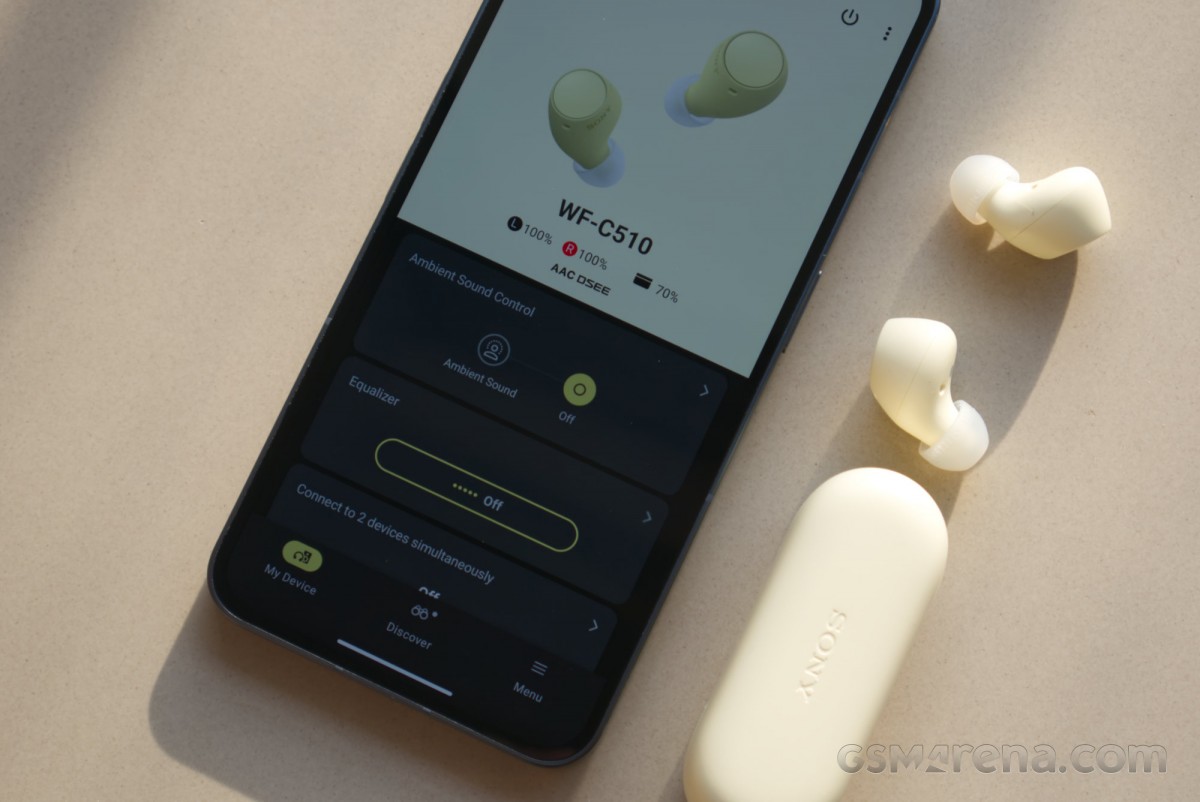Sony WF-C510 review – GSMArena.com news
2024-10-21 02:31:01
The WF-C510 are the latest entry-level earbuds from Sony. These are the no-frills option for someone who just wants a simple pair of earbuds for the everyday commute or workout without having to shell out a fortune on features they don’t need.
The C510 are the successor to the C500, which were reasonably popular despite not being the cheapest or feature-rich option on the market. Most people just seem to want a basic pair of earbuds from a brand they know and trust and the C500 fit the bill.
The C510 are taking a shot at essentially the same market again. With the updated model, Sony is introducing a new design that is even smaller and lighter than before along with an updated battery life of 11 hours, and multipoint connection. There’s also a transparency mode even though there’s still no active noise cancellation. All the while still coming in at the same $100 price tag. Is that enough to justify an upgrade? And what about the similarly priced competition? Let’s find out.
Design and comfort
The design of the C510 sees a major rework over their predecessor with Sony doubling down on the small and light aspect. The new case is tiny, certainly the smallest I’ve ever seen, and barely takes up any room at all in your pocket or bag. There is a downside to this, of course, but we’ll get to that in the battery section.
The C510 comes in four new colors, white, black, blue, and the yellow featured here. The blue and white are soft, pastel hues with the yellow being just a couple of shades away from being off-white. Both the case and the earbuds feature matte-finished plastics throughout, which accentuates the muted colors.

The new earbuds are both smaller and lighter than the previous generation model. In fact, Sony claims the C510 are its smallest in-ear earbuds yet. They truly are tiny and barely take up any space at all in your ears nor stick out too much.
A large portion of the exterior of these earbuds are the physical buttons for controlling various functions. Like with the previous generation model, these are perhaps a touch too large, which results in inadvertently pressing them whenever you are inserting the earbuds in your ears. Also, since they are physical buttons that need to be pushed in, you end up pressing the entire earbud deeper into your ear every time you press them, which can feel uncomfortable.


On the topic of comfort, the C510 are generally comfortable to wear, even for extended durations. However, the ear tips don’t quite seem to have the pressure release design of modern in-ear models, which relieves pressure while inserting or removing through a side vent. As such, there is a fair amount of suction felt while inserting or removing these and you need to take it slow so you don’t put too much pressure on your ears. I found it best to slightly twist and corkscrew while inserting or removing them as this felt the most comfortable. However, once in, I didn’t feel any discomfort.
In terms of build quality, the C510 feel very well-built despite being an entry-level model. They also feature an IPX4 rating, which makes them splash-resistant.
Software and features
The C510 are compatible with Sony’s Sound Connect app, which is a refreshed version of the app that has been around for a while. At first it seems less cluttered but that’s only because Sony has done the equivalent of shoving everything under the carpet by placing all the options inside a menu, where it looks just like it did before. So it’s the same app but now with one extra step. It also still takes far too many steps to set up.
Since this is an entry-level model, there aren’t a lot of features to adjust in the app. Right at the top is the Ambient Sound Control, which is what Sony calls its transparency mode. You can either simply toggle it on or off or adjust its intensity. There is also a voice passthrough mode that prioritizes voices over other sounds.
The app also features a manual EQ with five frequency bands and a separate Clear Bass slider. There are also a bunch of presets available and you can have three custom presets. If an EQ seems too complicated, then Sony has a new feature that lets you pick from one of five options that sounds the best to you while you play your music in the background. After you pick one, another five appear that let you further fine-tune your selection. The app then generates an EQ profile based on your preference and saves it to one of the custom profiles.
The app also offers 360 Reality Audio, which is Sony’s 3D surround sound feature for headphones that never really caught on. You need to calibrate the feature to your specific head and ear shape by taking pictures of your ears and the app then generates an HRTF profile for you. This is then used by apps that offer audio in this format. The problem is, there really aren’t that many apps that do that at the moment and they are likely to get even fewer as time goes on. Also, outside of those apps, you can’t use the profile you generate and it can’t be used for other formats such as Atmos, so it’s largely an exercise in futility.
Finally, there’s Sony’s DSEE or Digital Sound Enhancement Engine, which claims to restore some of the lost detail in compressed media. This feature is really meant to be used with highly compressed audio and becomes functionally placebo at higher bitrates. Toggling it even with Spotify audio made no audible difference.


The app also lets you customize the function of the buttons on the earbuds. The functionality is rather restrictive as you can either assign ambient sound or playback controls to the buttons but you can change, for example, the specific playback control gestures. I personally would have liked to disable the single press gesture for play/pause since it always triggers unintentionally but that isn’t possible. Either you need to enable all functions as they are or disable them entirely.
Moving on to the features, as noted earlier, the C510 lacks active noise cancellation. Back in the day, this would have been fine as no one would have expected an entry-level pair of earbuds to have ANC. However, that’s not the current landscape and many, if not all, of the competing options now have proper active noise cancellation built-in. This includes stuff like the OnePlus Buds 3, which has pretty great noise cancellation for the price.


However, Sony takes the cost-cutting to another level by also omitting basic features such as in-ear detection for automatic play/pause functionality. I complained about its absence in the recent OnePlus Nord Buds 3 review, which cost half as much as the C510, so there’s really no reason for the C510 to get a pass here.
Finally, Sony has once again gone with only the most basic codecs. Considering it literally created LDAC, it’s awfully stingy with how often it implements it in its own products.
Performance
Audio quality
The C510 feature a single 6mm dynamic driver with 20-20,000Hz frequency response. The earbuds support SBC and AAC codecs over Bluetooth 5.3.
The C-series models have historically had the most balanced tuning among Sony’s consumer line of audio products, and Sony even describes them as such. However, “balanced” for Sony usually amounts to not having a lot of bass. Outside of that, the C510 follow the typical blueprint for Sony audio, which is mellow and somewhat dark with added warmth in the low-end.
Starting with the bass, the C510 tuning is vastly more conservative compared to its other models and also much of the competition. The low-end does not blow you away with a ton of low-bass or even mid-bass energy. There is a slight bump in the mid-bass but it never gets overwhelming or even distracting. Low-bass is also lacking somewhat so the deeper registers don’t quite have the same thump and rumble that you’d expect.


The mids start off a bit weak with slightly subdued low-mid but then pick up well with a fully fleshed-out mid and upper mid-range response. The treble is where the sound loses quite a bit of its energy, with a fairly retracted and subdued response across the range. There isn’t even the typical upper treble sparkle here; the treble is just dull across the board.
So how does all this sound? At first impression, the sound is undeniably blunt and muted in the upper frequencies. However, after spending a few hours, it did not bother me as much as it did initially. The sound is mellow but the overall tonality is quite pleasing. I quickly learned that the sound is at its best with older, often poorly recorded music, which tended to be quite bright. My 70s and 80s playlist played beautifully on these earbuds with excellent vocals and an adequately fleshed-out high-end. The slight bump in the bass also helped make up for the lack of low-end on these older tracks.
This was also true for other genres that are inherently bright, such as electronic music as well as popular music from Japanese, Latin, and Indian languages. The upside of the subdued tuning is that the sound isn’t fatiguing and you can listen for hours without discomfort.
What the C510 doesn’t do well with is complex arrangements and instrumentals. Soundtracks with multiple instruments layered are handled clumsily with an unfocused, muddy sound. The pipe organ in Hans Zimmer’s Cornfield Chase from the Interstellar soundtrack just doesn’t have the same presence or impact as it just melds with the other sounds and the crescendo in Mountains from the same album is anti-climatic. The moment you give the earbuds anything even slightly technical, the sound just falls apart, exposing the inherently entry-level nature of the setup.


I will say, however, that I was really impressed with the imaging and, to some extent, the soundstaging performance of the earbuds. Objects are placed very well in the sound field, which makes some stereo effects very convincing.
Overall, the C510 manage to sound pleasing despite not being technically impressive. However, how much you find that true will depend greatly on what you like to listen to.
Microphone
The C510 have decent microphone performance. Voices were a bit quiet but mostly clear and natural without too much artificial garbling by the noise cancellation. The noise cancellation also does a great job of blocking out ambient noise and the voice quality does not change much even in noisy environments. Overall, a capable performance for those who require good call quality.
Noise cancellation
The C510 lack active noise cancellation. However, the design of the earbuds and especially the ear tips create a fantastic seal that is very capable of blocking a lot of ambient noise passively. Most of the time I wasn’t aware of things like fans, air conditioners, keyboards, or even people speaking nearby. Sure, it can’t quite get rid of the low-frequency hum like active noise cancellation can, which makes them worse on airplanes but for everywhere else, the passive isolation is plenty good.
So good, in fact, that the included transparency or the Ambient Sound mode becomes a necessity. This feature works really well and the quality of sound is pretty natural. The option to focus on vocals is especially handy when all you want is to hear people around you and not necessarily everything else.
Latency
The C510 have mediocre latency performance. When paired to a PC, there is a delay in the region of 200-250ms when watching video content. Not everyone is sensitive enough to notice that but if you are then it might be a deal breaker depending upon the content you watch. For some things, I wasn’t too bothered by the delay, especially if the video was animated or had a low enough frame rate. But you wouldn’t catch me gaming with these, especially since Sony still does not include any sort of game mode on its Bluetooth products.
Connectivity
The C510 had decent connectivity performance. In general, the connection was stable without any interruptions or disconnections.
One minor annoyance with the connectivity was the slight delay between the two earbuds when adjusting the volume. This delay exists on most earbuds as only one earbud is actually connected to the phone and the other earbud connects to the first earbud, so all signals need to be relayed from one earbud to the other.


However, on the C510, this delay was especially noticeable so all volume adjustments had one earbud changing before the other with a more than usual bit of delay. It’s not too bad but it was hard for me to not notice it every single time the volume was adjusted.
The C510 do support multi-device pairing, which has become a handy feature for those who like to connect to their phone and either a computer or tablet at the same time. It works well and you can manage both devices through the app.
Battery Life
The C510 has a claimed battery life of 11 hours with the case holding another 11 hours. Sony also claims 1 hour of playback after a five-minute quick charge.
In the past, I’ve seen Sony Bluetooth products blowing past their claimed battery life figures so I wasn’t the least bit surprised when the C510 managed to return 14 hours and 14 minutes of continuous playback. That’s over 14 hours of continuous playback from a pair of wireless earbuds without any charging in between, which is a crazy good result.


I also know that the DSEE feature is known to reduce the battery life to some extent and sure enough, with it enabled, the earbuds lasted for just under 13 hours. That’s still a fantastic result but considering the feature didn’t do much in my testing I would just leave it off.
As for the 1-hour claim, I did manage to get just over an hour with DSEE disabled and just under an hour with it enabled, so that checks out.
As good as the battery life results are, it has to be mentioned that the case only holds one extra full charge for the earbuds. And while a combined battery life of over 25 hours isn’t bad, it isn’t as high as most of the competition, which may not last as long in continuous playback but do hold more charge in the case for a longer total playback. In practice, that matters more than just 14 straight hours of playback that no one would need on earbuds.
Conclusion
Sony’s latest entry-level earbuds are a mixed bag. On one hand, the compact design of the earbuds and the case is delightful and the battery life for continuous playback is outstanding. There’s also good microphone performance along with robust connectivity that supports pairing to two devices. And while there is no active noise cancellation, the passive sound isolation works quite well and the Ambient Sound mode is really effective.
On the other hand, the strong suction of the earbuds that enables that passive noise isolation can be uncomfortable. The buttons on the side are also quite easy to press accidentally and offer limited customizability in the app. There is no in-ear detection for automatic play/pause, which is unbecoming for an audio product in 2024, even if it’s entry-level. The passive noise isolation, while impressive, can’t compete with actual ANC that the competition now offers. The latency is also a bit high for gaming. And finally, the case holds a very limited amount of charge that affects total battery life.


The sound quality embodies the mixed nature of the overall product; while it can be genuinely pleasing and enjoyable in some genres, it is quite unremarkable in others.
Depending upon where you live, the WF-C510 cost the same or even more than some of the competing options on the market, such as the OnePlus Buds 3. The OnePlus option is superior on almost every count, which makes the C510 hard to recommend on pure value. But if you have your heart set on a Sony product then you don’t really have a lot of options in this price range.
Source link
www.gsmarena.com
#Sony #WFC510 #review #GSMArena.com #news

















